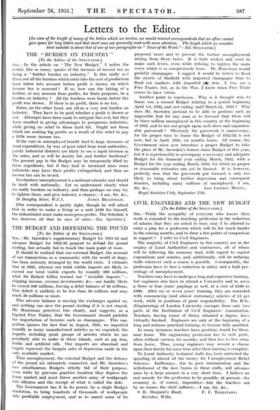CIVIL ENGINEERS AND THE NEW BUDGET
[To the Editor of the SpEcr.kToa..]
Sin,—While the sympathy of everyone who knows their work is extended to the teaching profession in the reduction of salaries that they are asked to bear, may I be allowed to enter a plea for a profession which will be hit much harder in the coming months, and to draw a few points of comparison in support ? I refer to Civil Engineers.
The majority of Civil Engineers in this country are in the employ of Local Authorities and contractors, all of whom will be following the economy lead, with regard to capital expenditure and salaries, and, additionally, will be reducing staffs wherever such a course is possible. Consequently, the profession have to face a reduction in salary and a high per- centage of unemployment.
Teachers may have to undergo a long and expensive training, but engineers also have to attend a University and to serve a three or four years' pupilage as well, at a cost of £100 to £300. After six or seven years' training, they are rewarded with commencing (and almost stationary) salaries of £3 per week, while in positions of great responsibility. The B.Sc. (Engineering) of London University exempts from only two parts of the Institution of Civil Engineers' examination. Teachers, having (some of them) obtained a degree, have virtually finished. Engineers are only at the beginning of a long and arduous practical training, to become fully qualified.
In many instances teachers have positions found for them, near home. The engineering profession has to seek posts, often without success, for months, and then has to live away from home. Thus, young engineers may remain a charge upon their family for some time after their training is complete.
To Local Authority technical staffs has been entrusted the spending of almost all the money for Unemployment Relief Schemes. Inefficiency, due to poor remuneration and the withdrawal of the best brains in these staffs, will advance rates by a large amount in a very short time. I believe no real remedy for the profession to be possible, at present—for economy is, of course, imperative—but the teachers are by no means the chief sufferers.—I am, Sir, &c.,


































 Previous page
Previous page